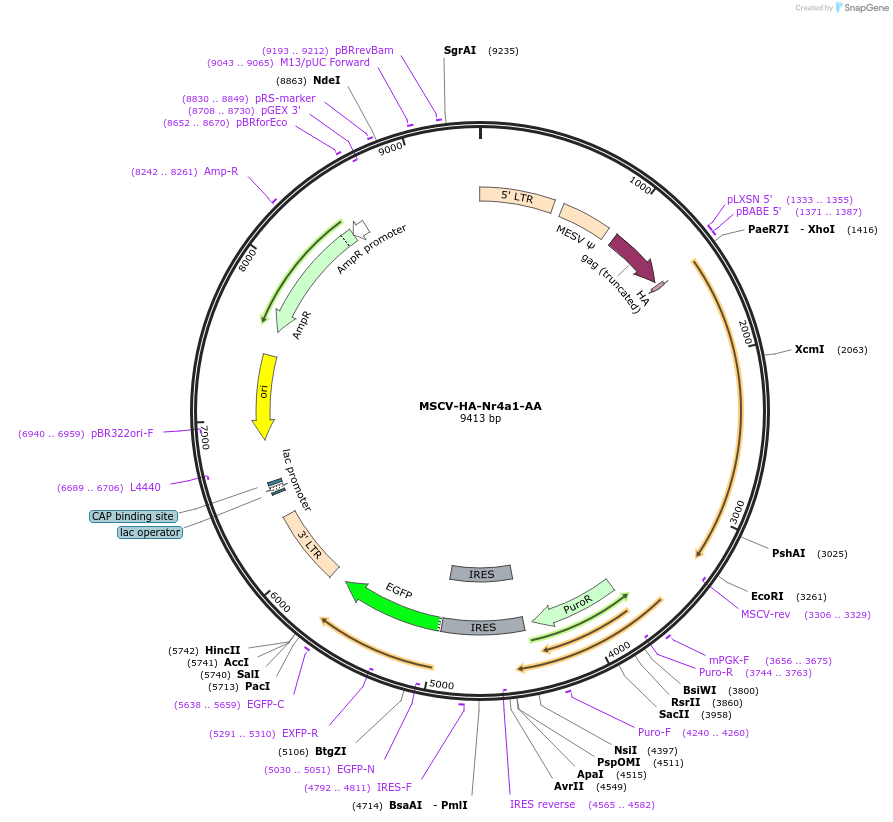MSCV-HA-Nr4a1-AA
(Plasmid
#160942)
-
PurposeGeneration of retrovirus for the overexpression of Nr4a1 mutant (287C 288EAA)
-
Depositing Lab
-
Sequence Information
Ordering
| Item | Catalog # | Description | Quantity | Price (USD) | |
|---|---|---|---|---|---|
| Plasmid | 160942 | Standard format: Plasmid sent in bacteria as agar stab | 1 | $85 | |
Backbone
-
Vector backbonepMSCV-PIG
-
Backbone manufacturerAddgene 21654
- Backbone size w/o insert (bp) 7656
- Total vector size (bp) 9456
-
Vector typeMammalian Expression, Retroviral
-
Selectable markersPuromycin
Growth in Bacteria
-
Bacterial Resistance(s)Ampicillin, 100 μg/mL
-
Growth Temperature37°C
-
Growth Strain(s)NEB Stable
-
Copy numberHigh Copy
Gene/Insert
-
Gene/Insert nameNr4a1
-
SpeciesM. musculus (mouse)
-
MutationChange Cys 287 Glu 288 into Ala Ala
-
Entrez GeneNr4a1 (a.k.a. GFRP1, Gfrp, Hbr-1, Hbr1, Hmr, N10, NGFI-B, NGFIB, NP10, NUR77-1, NUR77-2, TIS1, TR3, nur77)
- Promoter MSCV-LTR
-
Tag
/ Fusion Protein
- HA tag (N terminal on insert)
Cloning Information
- Cloning method Restriction Enzyme
- 5′ cloning site XhoI (not destroyed)
- 3′ cloning site EcoRI (not destroyed)
- 5′ sequencing primer pLXSN: cccttgaacctcctcgttcgacc
- 3′ sequencing primer MSCV Rev: cagcggggctgctaaagcgcatgc (Common Sequencing Primers)
Terms and Licenses
-
Academic/Nonprofit Terms
-
Industry Terms
- Not Available to Industry
Trademarks:
- Zeocin® is an InvivoGen trademark.
Depositor Comments
Please note: Plasmid contains a 47bp deletion in the PGK promoter. This deletion is not known to affect plasmid function.
These plasmids were created by your colleagues. Please acknowledge the Principal Investigator, cite the article in which the plasmids were described, and include Addgene in the Materials and Methods of your future publications.
-
For your Materials & Methods section:
MSCV-HA-Nr4a1-AA was a gift from Matthew Steinhauser (Addgene plasmid # 160942 ; http://n2t.net/addgene:160942 ; RRID:Addgene_160942) -
For your References section:
Targeting nuclear receptor NR4A1-dependent adipocyte progenitor quiescence promotes metabolic adaptation to obesity. Zhang Y, Federation AJ, Kim S, O'Keefe JP, Lun M, Xiang D, Brown JD, Steinhauser ML. J Clin Invest. 2018 Nov 1;128(11):4898-4911. doi: 10.1172/JCI98353. Epub 2018 Oct 2. 10.1172/JCI98353 PubMed 30277475





